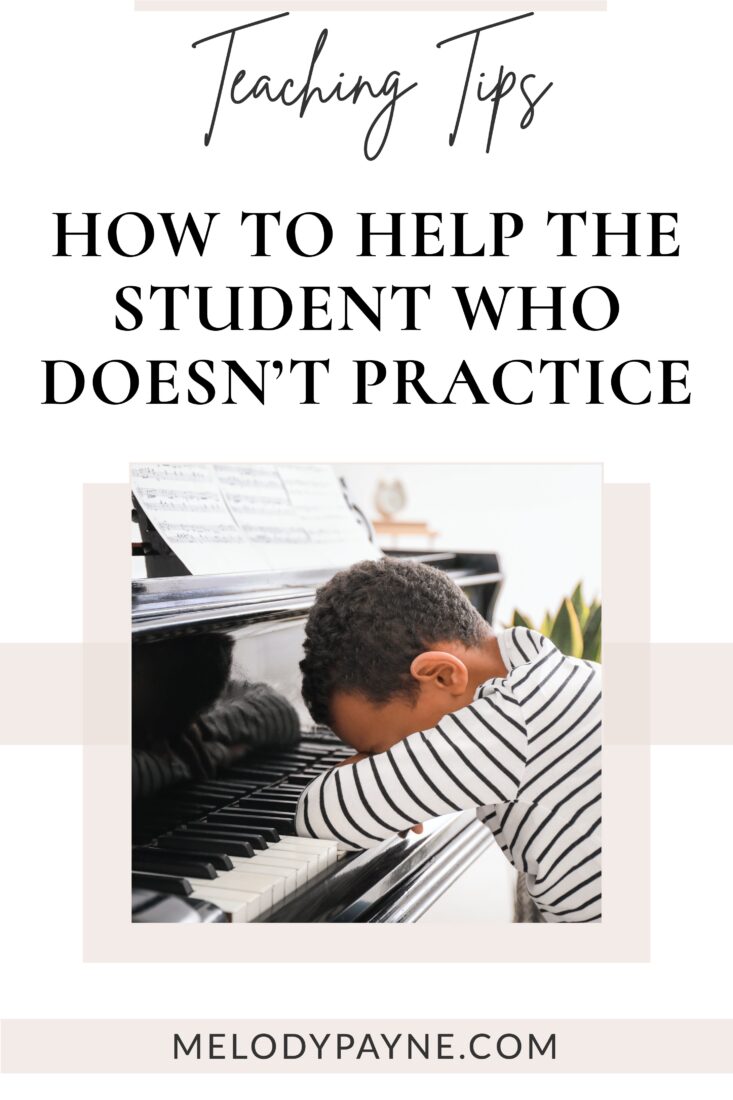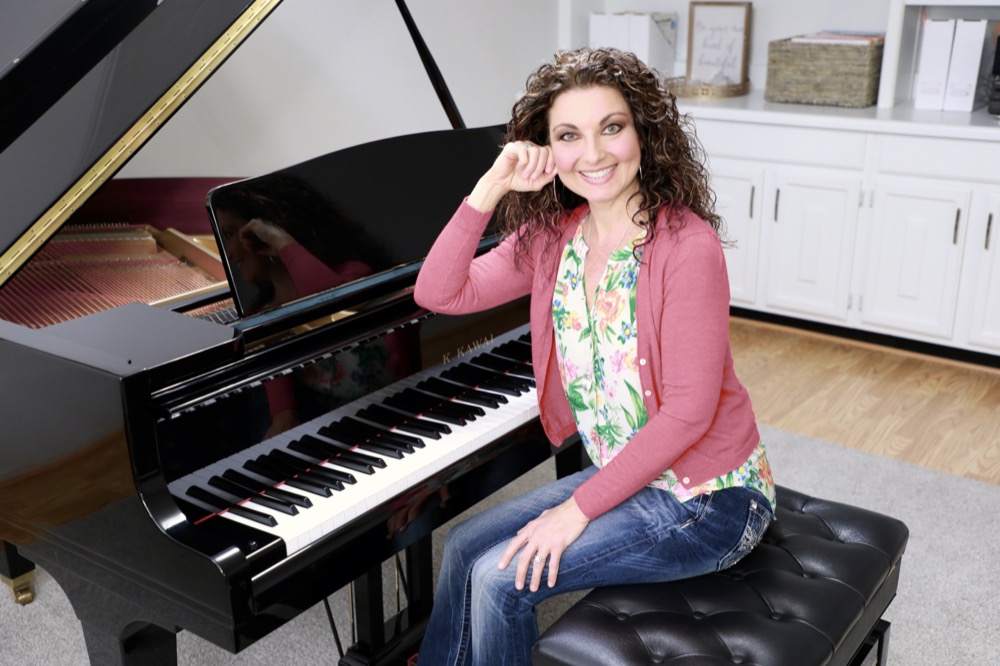How to Help the Piano Student Who Doesn’t Practice
This post may contain affiliate links. If you purchase something through an affiliate link, I will receive a small commission at no cost to you. For more information, read the disclosure statement here.
Do you teach piano students who don’t practice? In this article, we’ll define the student who doesn’t practice, list reasons why this piano student doesn’t practice, and discuss specific things we can do to help the student become an excellent and motivated practicer.
There’s even a list of things you can start doing in your lessons today to motivate and encourage your students and help them learn how to practice! Ready to turn your reluctant practicers into thriving students? Here are some things you can start doing today to build their confidence!

Let’s describe the student who doesn’t practice.
The student who doesn’t practice can be described in a variety of ways. Here are a few that come to mind:
The student who doesn’t practice is…
- A student with too many after-school activities who has to squeeze practicing in between baseball and gymnastics
- A student who “spins his wheels” and doesn’t accomplish much during practice sessions
- An adult with little extra time to devote to practicing piano
- A student who has not been taught how to practice correctly
- A student who does not know the definition of practice
- A student whose definition of practice is different from the teacher’s definition
- A student who does not know how to set goals during a practice session
- A student who seems motivated and willing during the lesson, but rarely touches the piano at home
- A student who insists that she practices for 30 minutes a day, but makes almost NO progress from week to week on the assignment
- The perfectionist student who is afraid of making a mistake, so she doesn’t practice
- A student who feels like other students in the family are monopolizing time at the piano and he can’t get his time in
- A student who goes to soccer only once per week and doesn’t have to practice soccer at home; this student doesn’t understand that piano is an every day activity
- A student who doesn’t feel like he’s getting any better, so he stops trying
Do any of these sound familiar? During my teaching career I’ve encountered all of the above at one time or another, and many others I’m sure.
Once we’ve identified who our reluctant student is, we need to figure out why the student is so reluctant or hesitant to practice.

Why is the student reluctant to practice?
In my own experience, here are some reasons the student might be reluctant to practice.
This student…
- Doesn’t understand how to practice in a way that helps him achieve results
- Isn’t motivated to practice because he doesn’t see any positive change during a practice session
- Doesn’t know how to focus attention on a specific task and work on it diligently until it is “learned”, “fixed”, “making progress”, etc.
- Doesn’t think 15 minutes of practice will help, so she doesn’t practice at all that day
- Doesn’t realize that correct practice is essential for improving
- Doesn’t know where to begin practicing because he is overwhelmed with the assignment
- Doesn’t want to practice how he perceives to be incorrect, so he doesn’t practice at all
- Thinks that spending time at the piano is the same thing as practicing
- Thinks playing through the assignment is the same thing as practicing it
- Has parents or other adults who are unavailable or unwilling to help
- Doesn’t like the piano methods and materials books, but doesn’t know how to articulate that to you
- Can’t remember what to practice because she doesn’t look at her assignment notebook/document
- Practices everything except the actual assignment
- Has a fixed mindset towards practicing instead of a growth mindset

Is it really reluctance? Could it be something else?
What we see on the surface might not be telling us the whole story about this student. We need to dig a little deeper into what is actually going on so we can discover the root cause and begin to address it.
For many students, what we perceive as reluctance might actually be…
- Fear of failure
- Doubts of his or her abilities
- Apprehension at learning something new
- A feeling of overwhelm with the size of the piano, number of keys, number of items on the assignment sheet, key signature, etc.
Here are a few questions we can ask to begin to discover the root cause of the reluctance.
- Is the student old enough to read, comprehend, and follow the assignment?
- Is the student a self-starter, or does he need someone to remind him to go to the piano every day?
- Does practicing piano feel too lonely/solitary? Is the student an introvert who doesn’t mind the solitude, or an extrovert who needs lots of social time?
- Does the student have a different learning style than the teacher?
- Does she “forget”? (In student terms, this might translate into “does not like piano” or “has something more fun to do”.)
- Is the student disillusioned because piano is much more difficult than he thought?
- Does she really want to take piano lessons, or is the lack of practice her way of communicating otherwise?
- Do the student and parents understand the level of commitment and hard work that are involved with piano lessons?
- Does the student need more ownership in choosing materials/pieces/parts of the assignment?
- Is there something going on at home? Family problems or a change in situation? Loss of job? Moving?
- Is something else going on? Learning difficulties? Hormone changes? A vision issue? Behavior or cognitive struggles?

What can we do to help?
Once we’ve determined who our reluctant practicer is, and a few reasons that might be contributing to the lack of practice, we can begin to help that student experience success during piano lessons by implementing a few of these ideas:
- Address this with the student and/or parent sooner rather than later
- Teach them how to practice in a way that helps them feel immediate success
- Use many different practice techniques that appeal to different types of learners and learning styles
- Offer choices from a variety of styles and pieces that the student has specifically requested
- Have them practice with and without our help in the lesson
- Be specific and realistic in our practice instructions and expectations
- Use age-appropriate practice and review techniques
- Use practice techniques that are efficient and effective
- Help parents and students create a daily schedule for distraction-free practice time
- Offer specific encouragement, praise, and rewards when appropriate and meaningful

What are some specific things we can start doing today?
Ready to get started and turn your reluctant practicers into thriving students? Here are some things you can start doing today to ensure that your students have the best possible chance for success.
- One small success can be the first step towards helping your student become someone who is excited about practice.
- Small and frequent successes during the lesson and during practice time lead to internal motivation.
- Internal motivation generates optimistic feelings of positivity which lead to a positive mindset towards piano practice.
- A positive mindset towards practicing leads to independent, sustainable, and mindful practice, which in turn leads to a student who actually enjoys practicing.
Here are some bite-sized things to try today, and we’ll be exploring ideas like these in more detail in future articles:
- Be absolutely certain the student has mastered all fundamentals
- Use interactive games and activities to solidify fundamentals
- Flashnote Derby app for iPad
- Note Rush app for iPad
- Boom Cards (There’s a free Boom Cards workshop in my Facebook Group)
- Music Theory websites such as www.musictheory.net
- Use simple but effective games to help with practice repetitions
- The penny/paperclip/eraser game
- Having students play a segment correctly in several (4 or 5) different octaves and styles helps with repetition and finding the passage quickly on the keyboard, especially useful for beginners
- Keeps the practice session interesting
- Keeps the passage fresh in the ear and mind
- Practice beyond the barline
- “+1 practice” or “favorite food practice”
- Ask students what their favorite food is
- Tell them to “chew” (practice) bite-sized portions of 1 measure + 1 beat
- “+1 practice” or “favorite food practice”
- Practice from the end
- Practice the last measure of a passage
- Then practice the last two measures of the passage
- Continue working backwards, adding a beat or a measure to the beginning of the passage until the passage is solidified
- Change up the scales routine
- “Spooky” 5-note scales/pentascales for Halloween
- Practice them in different styles and octaves
- Use the metronome to set a tempo goal (read How to Choose the Best Metronome for Your Piano Students)
- My students’ favorites is using Superstar Scales (read my blog post about Beginning Superstar Scales here)
- Use sticky notes
- To mark practice spots in the music
- To offer praise to students
- Mark the score
- Look for similar passages, differences in passages, dynamics, articulation, etc.
- Compare and contrast
- Correct repetition
- Correct repetition
- Correct repetition!
Further Reading About Music Teaching
- AMT American Music Teacher Magazine
- Piano Magazine
- Intelligent Music Teaching: Essays on the Core Principles of Effective Instruction by Robert (Bob) Duke
- Professional Piano Teaching by Jeanine M. Jacobson
- Questions and Answers: Practical Advice for Piano Teachers by Frances Clark
- Teaching Problem Solving in Practice – Music Educators Journal, Volume 91, No. 2, page 35, by James Byo
- The Piano Student’s Guide to Effective Practicing by Nancy Breth
- The Quotable Teacher edited by Randy Howe
Other blog posts about inspiring piano students
Don't miss out!
Follow on Facebook and Instagram, join the best Facebook group for piano teachers, and subscribe to the newsletter to get helpful teaching tips, resources, and tutorials delivered straight to your inbox every week.
Melody Payne
Melody Payne
Welcome!

Hi! I’m Melody Payne, a pianist and piano teacher, educational resource author, a fun-loving wife to the most wonderful and talented hubby I could ask for, and a lifelong learner who loves to share. I want to make your life as a music teacher easier by writing and sharing helpful and relevant music teaching articles, and by creating educational resources with your very own students in mind. If you are a parent who wants to enroll your child in piano lessons, I’d love for us to get started building those skills that can give your child a lifetime of musical enjoyment!


This Post Has 4 Comments
Thank you so much for this! I really need to revitalise my students’ practising and this has helped me so much!
You are very welcome, Kate! I’m happy to know you found some ideas to try in your studio. Thanks so much for reading!
Great article, Melody! Thanks for sharing!
Thanks so much, Chris! And thanks for reading 🙂